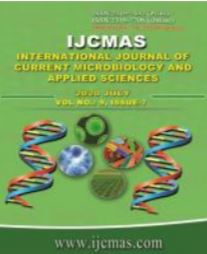


 National Academy of Agricultural Sciences (NAAS)
National Academy of Agricultural Sciences (NAAS)

|
PRINT ISSN : 2319-7692
Online ISSN : 2319-7706 Issues : 12 per year Publisher : Excellent Publishers Email : editorijcmas@gmail.com / submit@ijcmas.com Editor-in-chief: Dr.M.Prakash Index Copernicus ICV 2018: 95.39 NAAS RATING 2020: 5.38 |
Neonicotinoid insecticides are widely used nowadays to control many sucking insect-pests in several horticultural crops. They are neurotoxic and systemic in nature and their indiscriminate use may affect both target as well as beneficial insects. They are persistent insecticides and can enter food chain through soil application because of high water solubility. Microbes play an important role in removing toxic insecticides from soil environment and microbial degradation can be considered to be a cost effective mechanism to detoxify the insecticides. This article focuses on microbial biotransformation of neonicotinoid insecticides in soil environment. Many bacterial strains have been isolated from soil, which are capable of degrading neonicotinoids to non-toxic compounds by using these insecticides as additional carbon source. Microbes can fasten the transformation of insecticides in soil and thereby reducing the chance of their entry into food chain. Studies have indicated that enhanced biodegradation of neonicotinoids can be achieved with microbial consortium under favourable environmental conditions. However, substantial research on identification of neonicotinoids-degrading microbial strains and identification of the genes and enzymes responsible for their degradation need to be carried out to understand the transformation pathways and advance bioremediation efforts.
 |
 |
 |
 |
 |